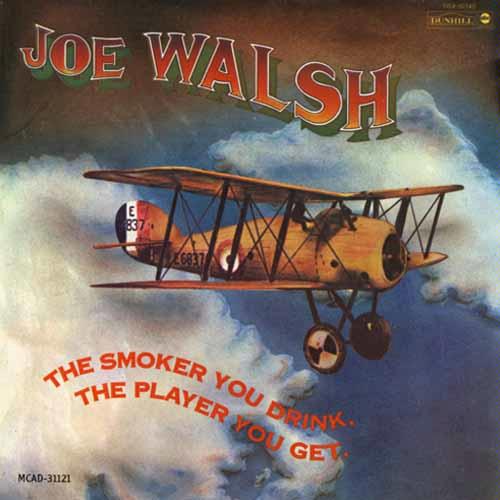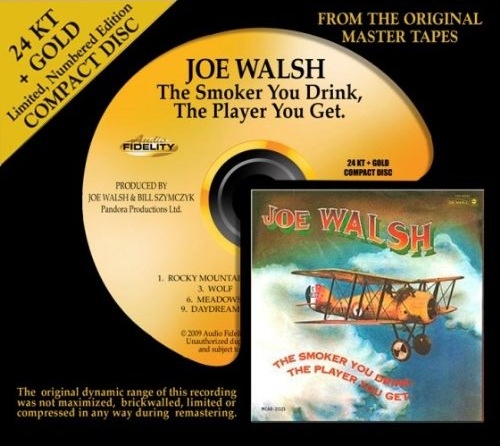Is Mastering Important?
As a recording engineer, I am often asked if mastering really matters. It does, and I've got a little assignment for those who care. It'll cost you a little coin ($37, including shipping from Amazon) but you'll get a feel for the importance of mastering, you'll get some fine classic music, and you'll end up with one heck of a good coaster as well. Let me explain. But first, some history.
1973 was an eye- and ear-popping time for music. Jimi Hendrix and Duane Allman had just passed and it was time for a second rank of guitar heroes to step up to the plate. Up from the weeds of “every guy in the world playing guitar” floated a few new talents, one of whom was Joe Walsh, who was just ending a run with the Cleveland-based James Gang. Joe and Dan Fogelberg camped out in Irv Azoff's car in Hollyweird and searched for new record deals. Joe was picked up by the ABC/Dunhill label and recorded a little-known first effort, Barnstorm. With his second solo album, The Smoker You Drink, the Player You Get, Joe ventured into progressive territory and made his big solo break. There were really only two straightforward rockers on the album, one of which, “Rocky Mountain Way,” has become his most requested song. Joe says, "If I had known I would be playing it the rest of my life, I'd have written a better song! It came to me while I was mowing my yard in Colorado. I rushed into the house to write the stuff down, leaving the mower to motor off into the next door neighbor's yard." The rest of the music on the album runs towards progressive and art rock.

Mmmm... I'm dating myself here, but I'll admit to buying that album on its first run and thinking, "Oh my gosh! I'll never learn this stuff - it's too complicated!" I'm happy to say that the first and last songs on the album have served as my opening and closing songs for numerous concerts over the years. So, anyway, I literally played the groves off my first vinyl copy of this album learning the songs. The acoustic guitar work on the album was gorgeous and melodic and drew me like a moth. The twelve-string guitars sounded lovely. But, at the time it was released, the album wasn’t just musically unique, it was also hailed as an audiophile treat and classic. Joe worked with his buddy, producer and engineer Bill Szymczyk (James Gang, Eagles, B.B. King, J. Geils, Rick Derringer, Edgar Winter, The Who, etc.), whose production goal was to make every album a complete “theater for the ears.” The Smoker was a very successful example of his efforts with extremely present acoustic guitars, in-your-face drums, really interesting ambience and effects treatments and panning, and an overall blend and “super-real” feel that made it a feast for the ears. Wherever I went in the audiophile world, this album was spinning.
Okay, so I’m a fan of the album, and at this point I’m on my third copy. There’s good reason, and that fact plays into our mastering lesson. My first copy was the first-run vinyl that enchanted me. Of course, when the CD was released in 1990, I rushed out to “re-buy” it. By that time, ABC/Dunhill and its back catalog had been purchased by MCA, who became notorious for slapping up whatever tape was handy, making a dub with what appeared to be little or no mastering, and calling it a Digital CD Master. The results ranged from horrible (Wishbone Ash’s Live Dates) to dull and lifeless (The Smoker You Drink the Player You Get). In this case, we’re talking flat, no depth, no high-end, tape drop-outs, midrangey, cardboardy, OLD sounding. What a let-down. In the succeeding years, as time wore on and memory faded, I began to wonder if the album had ever really sounded sparkling and exciting as I remembered it

It only took nineteen years for someone to get the idea, but in December of 2009, an outfit called Audio Fidelity released a lovingly-remastered 24 karat gold CD of The Smoker You Drink, the Player You Get. Apparently this company takes its model from the earlier Mobile Fidelity Labs, who released a string of carefully and elegantly remastered albums that took maximum advantage of the frequency response, dynamic range, and low-noise of the CD format to leave you with a beautiful digital rendition that did justice to the original release. Audio Fidelity spends the time, money, and effort to achieve this, and then passes the costs forward to a smaller base of discerning listeners who can hear the difference. Think of it as “mastering by subscription.” In fact, their website offers a subscription program where you can join and have their latest shipped to you automatically.
So what are the results on this album? The whole realm from 7000 Hertz upwards has been “opened up” without a hint of shrillness. It sounds as if you’d taken a blanket off the speakers. The twelve-string guitar parts on “Wolf” are immediate, sparkling, and in your face. Rhythm instruments like the maracas, brushed snares, and side-stick snares are much more alive. Speaking of snares, you can once again even hear the whisper of the snares when the toms are being struck. Ambiences make sense and are present and pretty. The rhythm section “works” again, with the relationship between the kick drum and bass guitar restored. The sound is smooth, clean, sparkling, and brand-new again. Bill Szymczyk’s fascinating soundscape, with its complex processing, sounds new and exciting once again. The eighth song, “Days Gone By,” features a dreamy closing “coda and fade” with the very best reel-to-reel tape flanging I’ve ever heard, and once again it swooshes and swirls smoothly and gloriously. The lovely piano that opens the last song, “Daydream/Prayer,” is probably emerging from the inner-groove distortion where it languished on the vinyl to full-definition for the very first time. Listen for the ebbing and flowing swirl of the brushed snare on “Dreams.” I mean, listening to this thing in its pristine glory again takes me back to the excitement and optimism I felt about the music and life when the album was new and I was sixteen years old.
And now the challenge: Buy both the Audio Fidelity and MCA discs as an investment in educating your ears. The MCA disk only costs $9.99. Play them against each other. Calibrate the level differences so you can get a good comparison. Listen for the differences in detail. Hear a prime example of the improvement good mastering can make for an album. As a bonus, you’ll get some great music and afterwards, the MCA disk can serve as a nifty coaster as well.

AUDIO FIDELITY WEBSITE
UPDATE: I contacted Audio Fidelity and congratulated them on their superb mastering job on The Smoker. Their president got back to me and sent me two more albums, Lynyrd Skynyrd's Second Helping and Linda Ronstadt's Heart Like a Wheel. Both turned out to be excellent restorations.
= =
=



